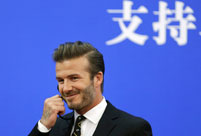 College girls call for protection of ecological space on earth
College girls call for protection of ecological space on earth
 Top 10 celebrities driving auto brands
Top 10 celebrities driving auto brands
 10 low-carbon tips to save money
10 low-carbon tips to save money
 Luxury cars make Asia premiere at Auto China
Luxury cars make Asia premiere at Auto China
 Versatile dog
Versatile dog
 Ni Ni covers BAZAAR JEWELRY
Ni Ni covers BAZAAR JEWELRY
 Cherry blossoms reach peak bloom in Washington D.C.
Cherry blossoms reach peak bloom in Washington D.C.
 Top Chinese fashion icons in foreigners' eyes
Top Chinese fashion icons in foreigners' eyes
 Asia's largest business aviation exhibition to be held in Shanghai
Asia's largest business aviation exhibition to be held in Shanghai
 World's top-rated luxury hotels
World's top-rated luxury hotels
TOKYO, April 24 -- Visiting U.S. President Barack Obama and Japanese Prime Minister Shinzo Abe on Thursday vowed to enhance bilateral ties and agree to continue their talks on the U. S.-led Trans-Pacific Partnership (TPP) free trade talks.
Obama, saying in the summit with Abe, commented the U.S.-Japan alliance as the "foundation" for not only the U.S. security in Asia-Pacific region, but also "for the region as a whole."
The president also welcomed Japan's efforts to lift its self- imposed ban on right of collective self-defense, despite the move goes contrary against Japan's current war-renouncing constitution.
By exercising the collective self-defense rights, Japan could counter attacks on Japan's ally even when Japan itself is not being attacked.
As to the TPP, Obama said in the joint press conference that the free trade talks should benefit the U.S. consumers and companies, adding the two countries are "closer to deal" on market access in TPP.
Japan and the United States are at odds over Japan's reluctance to remove its tariffs imposed on U.S. agricultural products, while the United States called on Japan to lift all tariffs on rice, wheat, pork and beef, sugar and dairy, which Japan sees as its key items, so as to conclude the free talks at an early date.
The president, furthermore, said that limited access to Japanese market must be addressed under TPP.
For his part, Abe said that the two sides have agreed to seek an early conclusion of the TPP free trade talks and they would release a statement after ministerial talks on TPP later the day.
Abe said that the two leaders' summit has vitalized the Japan- U.S. alliance and they will expand cooperation in the defense area.
The two countries also agreed to work together with South Korea and China to deal with nuclear and missile issues of the Democratic People's Republic of Korea (DPRK), with Obama mentioning that the United States may put more pressure on the DPRK.
Obama said that current situation in Ukraine should be resolved through diplomacy, rather than a military solution.
The U.S. president also urged Japan and China to tackle their territorial disputes through dialogue and not to escalate tensions, adding the United States and China shared a broad range of common interests and it supports China's peaceful development.
 4th Beijing Int'l Film Festival ends
4th Beijing Int'l Film Festival ends Commando elite specializes in sign language
Commando elite specializes in sign language Man photoshops himself into girlfriend's childhood photos
Man photoshops himself into girlfriend's childhood photos Photo story: Stallholders at Beijing Zoo Wholesale Market
Photo story: Stallholders at Beijing Zoo Wholesale Market Artists on backstage
Artists on backstage Beckham launches fund to support youth soccer in China
Beckham launches fund to support youth soccer in China Cherry blossoms hit peak bloom in Washington D.C.
Cherry blossoms hit peak bloom in Washington D.C. Children in ancient costumes learn Zhusuan
Children in ancient costumes learn Zhusuan Tens of thousands celebrate Water Splashing Festival
Tens of thousands celebrate Water Splashing Festival Giant panda Sijia is back to happy life
Giant panda Sijia is back to happy life Richest Chinese of 2014: half from the mainland
Richest Chinese of 2014: half from the mainland Chengdu - laid-back lifestyle makes happiest city
Chengdu - laid-back lifestyle makes happiest city The backstage of the Fashion Week
The backstage of the Fashion Week College students in Han costumes
College students in Han costumes Postgraduate works as waitress
Postgraduate works as waitressDay|Week|Month